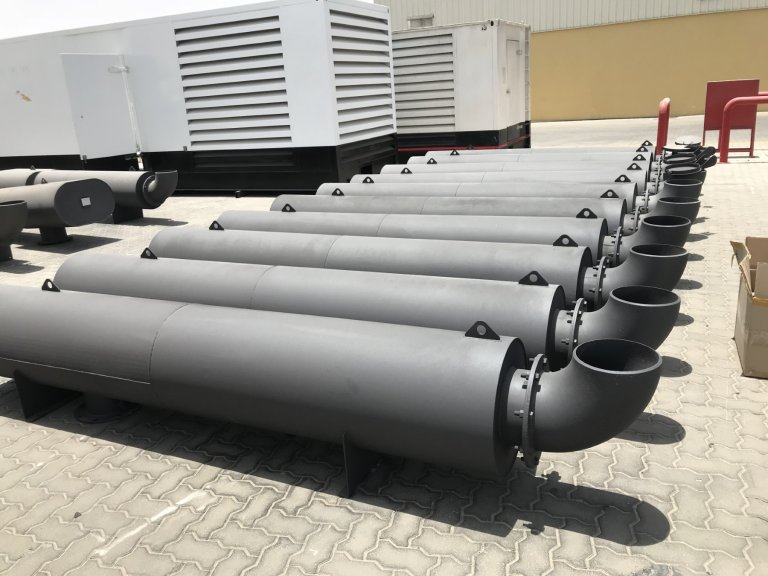Introduction to Generator Silencers
At Al Bahar MCEM, we understand the critical need for generator silencers in industrial, commercial, and residential sectors. Generators play a pivotal role in ensuring an uninterrupted power supply, yet the noise they produce can be a significant environmental and operational concern. This comprehensive guide delves into generator silencers, their types, benefits, and selection criteria to help engineers, facility managers, and procurement specialists make informed decisions.
What are Generator Silencers?
Generator silencers, also known as generator mufflers, are engineered acoustic devices designed to reduce the noise emitted from a generator’s exhaust system. They function by absorbing, cancelling, or dissipating sound energy, ensuring the operational environment remains compliant with noise regulations and comfortable for personnel.
Types of Generator Silencers
1. Residential Grade Silencers
These silencers are designed for small generators used in homes and small offices. They reduce noise to acceptable residential levels, typically achieving 15-25 dB(A) attenuation.
2. Industrial Grade Silencers
Industrial silencers are used in manufacturing plants, warehouses, and construction sites. They provide 25-35 dB(A) attenuation to maintain occupational safety standards and avoid disturbance to nearby operations.
3. Hospital Grade Silencers
Hospitals require stringent noise control due to patient comfort and health regulations. Hospital-grade silencers offer 30-40 dB(A) attenuation, ensuring minimal noise interference.
4. Critical Grade Silencers
For applications requiring maximum noise reduction, such as data centres, broadcasting stations, and military facilities, critical grade silencers achieve 40-50 dB(A) attenuation. They integrate advanced acoustic design to suppress exhaust noise to barely audible levels.
Key Components and Working Principle
Generator silencers consist of chambers, baffles, and absorption materials. The exhaust gases pass through internal chambers where sound waves are reflected, cancelled, or absorbed by acoustical lining materials like mineral wool or fibreglass. This reduces sound pressure levels without restricting exhaust flow, maintaining generator efficiency.
Factors to Consider When Choosing a Generator Silencer
1. Noise Attenuation Requirement
Determine the required decibel reduction based on environmental regulations and application needs. For residential setups, standard silencers suffice, while industrial sites may need hospital or critical-grade silencers.
2. Back Pressure Impact
Silencers add back pressure to the exhaust system. Excessive back pressure affects engine performance and fuel efficiency. Always consult with generator manufacturers for maximum allowable back pressure to ensure compatibility.
3. Material and Construction
Choose silencers built with corrosion-resistant materials like stainless steel or aluminised steel for durability in harsh operating conditions, especially in coastal or humid regions.
4. Size and Configuration
Silencer dimensions must fit within the generator installation layout. Consider horizontal, vertical, or side-entry configurations for optimal integration without modifying existing exhaust routing.
5. Compliance with Standards
Ensure silencers comply with ISO, OSHA, and local environmental noise regulations to avoid legal or operational setbacks.
Benefits of Using Generator Silencers
- Noise pollution control ensures a peaceful environment
- Compliance with statutory regulations and standards
- Protection of hearing health for operators and nearby personnel
- Enhanced operational safety by reducing auditory distractions
- Increased asset value due to an environmentally friendly installation
Installation Guidelines
1. Professional Assessment
Engage acoustic engineers to assess site noise levels and determine the attenuation requirement before procurement.
2. Correct Mounting
Use vibration isolators and flexible connections during installation to minimise structural transmission of vibrations and noise.
3. Exhaust Routing
Ensure exhaust piping is routed to avoid backflow or gas leakage. Position silencers away from air intakes to prevent recirculation of exhaust gases.
4. Regular Maintenance
Perform periodic inspections for corrosion, soot deposits, or damage to acoustic linings, which can deteriorate silencing performance over time.
Applications of Generator Silencers
- Commercial buildings and shopping malls
- Hospitals and healthcare facilities
- Data centres and IT facilities
- Construction sites and mining operations
- Residential complexes and villas
- Military installations and defence applications
Top Manufacturers of Generator Silencers
Leading generator silencer manufacturers include:
- Donaldson Company
- Nelson Global Products
- MIRATECH Corporation
- Universal Silencer
- Hengst Filtration
These companies offer standard and custom silencers tailored for different generator capacities, fuel types, and operational environments.
Trends in Generator Silencer Technology
1. Hybrid Acoustic Designs
Combining reactive and absorptive technologies for broader frequency attenuation while maintaining compact silencer sizes.
2. Advanced Materials
Use of ceramic fibre and high-temperature alloys to withstand elevated exhaust temperatures in gas and diesel generators.
3. Integrated Emissions Control
Modern silencers integrate catalytic converters and particulate filters, offering noise and emissions reduction in a single unit, essential for Tier 4-compliant generators.
Cost of Generator Silencers
The cost varies based on:
- Attenuation level required
- Material grade
- Customisation needs
Typically, prices range from USD 150 for small residential silencers to over USD 2000 for critical grade industrial silencers. Installation and freight costs are additional considerations.
Conclusion
Generator silencers are indispensable for modern power backup systems, ensuring operational safety, compliance, and comfort across industries. Investing in high-quality silencers not only mitigates environmental noise pollution but also enhances the reliability and lifespan of your generator systems



